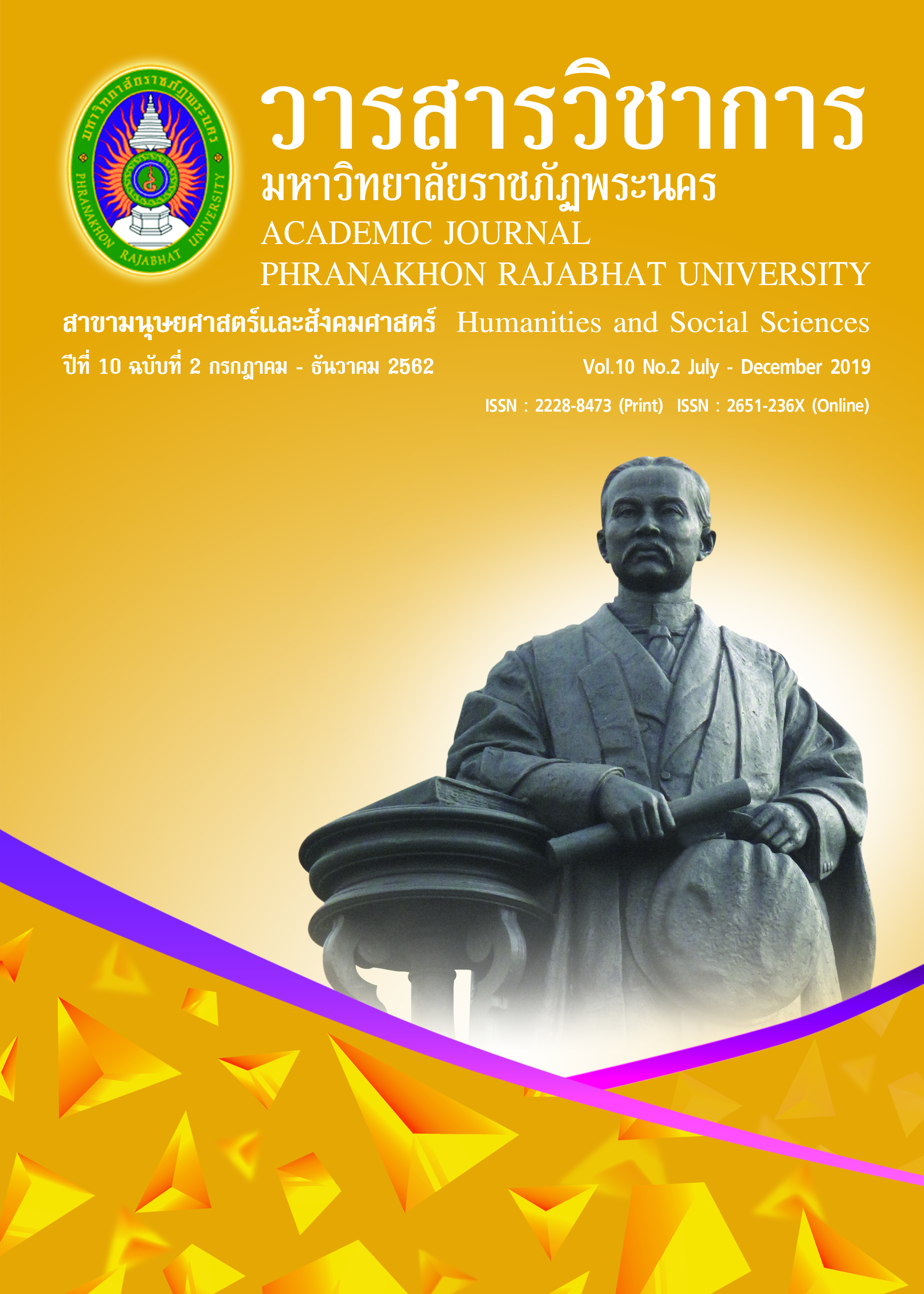THE PRIORITY NEDDS INDEX MODIFIED ANALYSIS OF LERTLAH KASET- NAWAMIN SCHOOL TEACHER DEVELOPMENT BASED ON THE CONCEPT OF TEACHER INNOVATORS ’ CHARACTERISTICS
Keywords:
Teacher Development, Teacher Innovators, The Present Circumstances, The Expected Circumstances, The PNI Modifed AnalysisAbstract
This quantitative research aims to study the requirement of development for teachers at Lertlah Kaset -Nawamin School based on innovative teachers’ characteristics. The data has been gathered from 20 staffs at the management level in the Lertlah Kaset-Nawamin School and 84 Thai teachers who teach in kindergarten, primary, and secondary levels in the academic year of 2018. The total sample size is 104 people. The research instrument used in this research is a questionnaire that surveys the present circumstances and circumstances of development for teachers at Lertlah Kaset-Nawamin School based on innovative teachers’
characteristics. The data were analyzed using descriptive statistics, which are frequency, percentage, mean, standard deviation, and PNI Modifed ranking. The results related to the present circumstances and the normal circumstances consisted of 6 skills, which are creativity, questioning, observation, venturing, experimentation, and network building. The fnding of the present circumstances of Lertlah Kaset-Nawamin
School based on innovative teachers’ characteristics was at a moderate level. In addition to the skill-level analysis, It appeared that observation, venturing and experimentation skills gain the highest means value ( = 3.09) followed by network building ( = 3.00), and the lowest is creativity ( = 2.95) The requirements of development for teachers at Lertlah Kaset-Nawamin School based on innovative teachers’ characteristics, it can be seen that the highest qualifcation is creativity (PNI = 0.61). The second requirement is questioning skills (PNI = 0.60). The third requirement is network building skills (PNI = 0.57). The fourth is venturing skills and experimentation skills (PNI = 0.54), while the lowest requirement is observation skills (PNI = 0.53)
References
Bass, B.M. & Avolio, B.J. (1990). Transformational leadership development. California : Consulting Psychologists Press.
Boonyam, T. (2011). The Multi-Level Causal Factors Influencing Individual and Group Innovative Behavior for Marking Product Innovations in Thai Private Companies (Doctoral dissertation). Bangkok: Srinakharinwirot University. (in Thai)
Brochure Lertlah School Division. (2017).The Best in English Program Schools and Leader in International Program Schools 25 th Anniversary.
Chaemchoy, S. (2012). Concept of innovation for school management in the 21st century. The Journal of Education Naresuan University. 14(2), 117-128. (in Thai)
Chaemchoy, S. (2015) Technology leadership: Bringing technology to classrooms and schools in the Century 21. The Journal of Education Naresuan University. 16(4), 216-224. (in Thai)
Couros, G. (2014). 8 Characteristics of the “Innovator’s Mindset”. Retrieved from : http:// georgecouros.ca/blog/archives/4783.
Couros, G. (2014). The Innovator’s Mindset: Empower Learning, Unleash Talent, and Lead a Culture of Creativity.
Daft, R.L. (2008). The leadership experience. 4th ed. Mason, OH: Thomson south-western.
Meesuwan, W. (2017). Factors contributing to characteristics of teacher innovators in educational technology in Professional Pre-Service Teacher Schools of the Naresuan University Network. The Journal of Education Naresuan University. 19(3), 50-61. (in Thai)
Newquist, E. (2015). 7 Characteristics of Highly Successful Innovators. Retrieved from
http://www.innovationexcellence.com/blog/2015/03/13/7-characteristics-ofhighlysuccessful-innovators/
Prajan, O. & Chaemchoy, S. (2018). Administrative Model for Development Teacher’s Innovative Thinking Skills in the Basic Education School. The Journal of Education Far Eastern University. 12(1), 156-169. (in Thai)
Prajan, O. & Chaemchoy, S. (2018). The basic education school management for developing teacher’ s innovative thinking skills. Educational Management and Innovation Journal, Chulalongkorn University, 1(2), 53-68. (in Thai)
Rogers, E. M. (1983). Diffusion of innovation (3rd ed.). New York: Free Press.
Schrum, L and Levin, B.B, (2009). Leading 21st Century Schools: Harnessing Technology for Engagement and Achievement. California, United States of America.
Songkram, N. (2014). Innovation: The students to be innovators (2nd ed.). Bangkok: Chulalongkorn University Press. (in Thai)
Sutthawart, W., & Siriwong, P. (2015). Educational Innovator’s Potential Development Method. Veridian E-Journal, Silpakorn University, 9(1), 749-765. (in Thai)
Sutthawart, W., & Siriwong, P. (2015). The basic educational innovator in public sector: A study for grounded theory. Veridian E-Journal, Silpakorn University, 8(2), 281- 300. (in Thai)
Vanichvasin, P. (2009). A development model of innovative leadership competencies as part of informal education to enhance learning of selected leaders in Thailand. Doctoral Dissertation, Assumtion University
Downloads
Published
How to Cite
Issue
Section
License
"บทความวิชาการในวารสารฉบับนี้ ถือเป็นความรับผิดชอบของผู้เขียนเท่านั้น"
สงวนลิขสิทธิ์ตามพระราชบัญญัติลิขสิทธิ์




